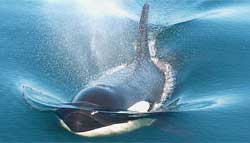Report a Cetacean Sighting

The BC Cetacean Sightings Network is a collaboration between Fisheries and Oceans Canada, the Habitat Stewardship Program for Species at Risk, and the Vancouver Aquarium Marine Science Centre.
Report an incident
Incidents involving marine mammals and sea turtles along our coastline are an unfortunate reality. At DFO, we do our best to monitor marine areas and respond to a range of incidents, but we also rely on information provided by the public.
An incident is a situation involving an animal in which some form of response may be required to assist in rescue and rehabilitation, collection of scientific sampling and data, or enforcement concerns. Incidents may involve marine mammals or turtles that are found alive, injured or dead. Some common examples of incidents include:
- An animal being harassed or injured
- An injured or sick animal exhibiting highly unusual behaviour
- A live whale, dolphin or porpoise stranded on land
- A collision between an animal and a vessel, or an animal that appears to have been struck by a vessel
- An animal that has become entangled in a net or other debris
- A dead marine mammal or sea turtle
- An animal that is tagged or branded
- A marine mammal or sea turtle seen in an unusual location or a species not commonly seen in BC (see below to report a sighting)
Attention:
If you observe, encounter or even just hear about an incident, please call DFO’s Observe, Record and Report 24-hour hotline at 1-800-465-4336. Response time can be crucial and is greatly assisted by detailed observations, so your reports are very important. Prompt reporting ensures that a rapid and effective rescue action can be initiated, resulting in a greater chance for survival for live animals or determination of cause of death in dead animals.
When reporting an incident, you may be asked to provide:
- Date and time you found the animal or witnessed the incident
- Specific location, including latitude and longitude (if available) or driving directions (if accessible by land)
- Species or type of animal, including a description of the size, colour, features
- Condition of the animal – alive, sick or injured, freshly dead, badly rotting away
- Number of animals involved
- Your contact information, including name and phone number
Caution: Please do not touch or move an animal yourself. Marine mammals can carry diseases transmissible to humans, or you may inadvertently do more harm to the animal.
DFO coordinates a network of government and non-government experts in disentanglement, strandings, animal illness, and behavioural assessment. While, not every incident warrants a field response or further investigation, all reports are recorded and contribute to a better understanding of these species and the threats they face.
Your assistance in supporting this important conservation and research program is sincerely appreciated.
Why Get Involved?
British Columbia's expansive coastline is home to twenty-three species of cetacean (dolphins, whales and porpoises), six of which are either endangered or threatened. An understanding of their distribution and abundance is crucial to conservation efforts. However, monitoring these coastal waters year-round is impossible for researchers without help from the public.
In 1999, the BC Cetacean Sightings Network was established to collect and compile sighting reports submitted by the public. When analyzed, these sightings data create a clearer picture of cetacean habitat use and aid in our understanding of these creatures and their requirements.
Please get involved!
Join the hundreds of participants from all over our coast in helping conserve our cetaceans. Increase your awareness of BC cetaceans and let us know what you see. Environmental stewardship begins at home and in your daily life. If you see a whale, dolphin or porpoise we'd like to know!
How you can help
If you see a whale, dolphin or porpoise submit a sighting report to us via the Sightings Network website or email address. (see below for more information).
What to look for:
- date and time of sighting
- location of sighting (chart names and/or latitude and longitude)
- sea state and wind speed
- sighting distance
- approximate length of the cetacean
- behaviours of the cetacean species observed (and your degree of confidence in the identification
- number of individuals
Additional information
Sightings of large whales (including killer whales), sea otters and marine turtles are of particular importance because of their declining population status. Prompt reporting of these important sightings is very valuable in achieving DFO science objectives and can assist researchers in locating the animals and furthering their investigations.
Partnership arrangements
The federal government recognizes the important role that stewardship plays in species and habitat conservation. Under the Species at Risk Act (SARA), the Habitat Stewardship Program (HSP) was established to support non-government organizations and communities in protecting Canada's wildlife. The goal of HSP is to contribute to the recovery and protection of habitat for priority listed species at risk, and for other species of special concern. Fisheries and Oceans Canada, Environment Canada and Parks Canada are working together and through partnerships to making stewardship a successful conservation tool in Canada.
In the Pacific Region, HSP projects related to marine mammals, marine turtles and their habitat are working together with DFO to protect numerous species:
- BC Cetacean Sighting Network, Vancouver Aquarium Marine Science Centre
- Pacific Leatherback Awareness and Sightings Network
- Marine Mammal Monitoring (M3) Project, Veins of Life Watershed Society
- Straitwatch
To Report a Sighting
- Phone: 1-866-I SAW ONE (472-9663)
- Email: sightings@ocean.org
- BC Cetacean Sightings Network: Report a Sighting
- Download the WhaleReport app: available on iOS and android.
To find out more about marine mammals and turtles
- Date modified: